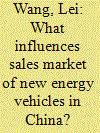| Srl | Item |
| 1 |
ID:
084001


|
|
|
|
|
| Publication |
2008.
|
| Summary/Abstract |
Active learning as a means to achieve qualitative, that is "deep," learning has become an accepted form of learning and teaching in higher education. The subject of UN studies has been at the forefront of active learning since the introduction of Model United Nations in the early twentieth century. However, the fact that active learning has become "fashionable" raises the question of whether its application continues to achieve its intentions and therefore its full potential. This article questions the promise of active learning in UN studies by analyzing the way in which students learn about the UN, be that in Model United Nations simulations or in the classroom. It demonstrates how conventions of UN teaching (and research) obstruct the achievement of true deep learning and develops principles for a new curriculum that acts as active learning tool, that is, one that supports students understanding of the subject. These principles are developed into outlines of "best practice" curricula.
|
|
|
|
|
|
|
|
|
|
|
|
|
|
|
|
| 2 |
ID:
176807


|
|
|
|
|
| Summary/Abstract |
In recent years, new energy vehicles (NEVs), which are considered to be one of the most important ways of solving global warming and energy crisis, have seen rapid development. Owing to the far-reaching policy implemented by Chinese government, the sales volume (SV) of NEVs has seen an exponential growth, and China has become the world's largest consumer of NEVs. The objective of this study was to determine the focus of Chinese consumers with regard to NEVs and to understand how their interests influence the SV. We used data mining combined with deep-learning technologies to investigate a large number of purchase reasons and found that the primary motivating factors were the vehicle, demographic characteristics, and national policy. Additionally, to determine how these factors affect the market, we used correlation analysis to examine the relationship between the SV and the factors. The results indicated that national policies, infrastructure, demographic factors, and safety awareness are closely related to the SV. The findings of this study suggest valuable strategies for government departments, allowing them to publish relevant policies, and manufacturers, allowing them to target specific consumer groups. This approach addresses the environmental concerns by promoting the utilization of NEVs rather than traditional fuel vehicles.
|
|
|
|
|
|
|
|
|
|
|
|
|
|
|
|